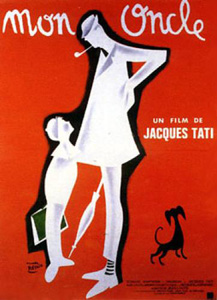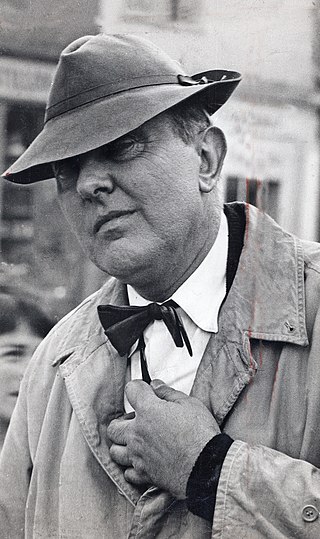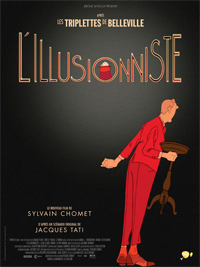
Jacques Tati was a French mime, filmmaker, actor and screenwriter. In an Entertainment Weekly poll of the Greatest Movie Directors, he was voted the 46th greatest of all time, although he directed only six feature-length films.

René Clément was a French film director and screenwriter. He is known for directing the films The Battle of the Rails (1946), Forbidden Games (1952), Gervaise (1956), Purple Noon (1960), and Is Paris Burning (1966). He received numerous accolades including five prizes at the Cannes Film Festival and the Honorary César in 1984.

Mr. Bean's Holiday is a 2007 comedy film directed by Steve Bendelack and written by Hamish McColl and Robin Driscoll, from a story penned by Simon McBurney. Based on the British sitcom series Mr. Bean created by Rowan Atkinson and Richard Curtis, it is a standalone sequel to Bean (1997). The film stars Atkinson as Mr. Bean, with Maxim Baldry, Emma de Caunes, Willem Dafoe and Karel Roden in supporting roles. In the film, Mr. Bean wins a trip to Cannes, France, but on his way there, he is mistaken for a kidnapper and meets an award-winning filmmaker after he travels with both a Russian filmmaker's son and an aspiring actress in tow.

Mon Oncle is a 1958 comedy film directed by Jacques Tati. The first of Tati's films to be released in colour, Mon Oncle won the Academy Award for Best Foreign Language Film, a Special Prize at the 1958 Cannes Film Festival, and the New York Film Critics Circle Award for Best Foreign Language Film, receiving more honours than any of Tati's other cinematic works.
Alain Romans was a French jazz composer. He studied in Leipzig, Berlin, and Paris. His teachers included Vincent d'Indy. He later worked with Josephine Baker and Django Reinhardt.

Monsieur Hulot is a character created and played by French comic Jacques Tati for a series of films in the 1950s through the early '70s, namely Les Vacances de Monsieur Hulot (1953), Mon Oncle (1958), Playtime (1967) and Trafic (1971). The character of Hulot also appears briefly in François Truffaut's Bed & Board (1970).

Playtime is a 1967 comedy film directed by Jacques Tati. In the film, Tati again plays Monsieur Hulot, the popular character who had central roles in his earlier films Les Vacances de Monsieur Hulot (1953) and Mon Oncle (1958). However, Tati grew ambivalent towards playing Hulot as a recurring central role during production; he appears intermittently in Playtime, alternating between central and supporting roles.

Trafic (Traffic) is a 1971 Italian-French comedy film directed by Jacques Tati. Trafic was the last film to feature Tati's famous character of Monsieur Hulot, and followed the vein of earlier Tati films that lampooned modern society.
Jacques Cottin was a French costume designer whose films included Jour de fête (1949), Mon oncle (1958), and Playtime (1967), for Jacques Tati. In 1970 he had a cameo in François Truffaut's Bed and Board, playing the character of Monsieur Hulot, made famous by Tati.

The Illusionist is a 2010 animated film written and directed by Sylvain Chomet. The film is based on an unproduced script written by French mime, director and actor Jacques Tati in 1956. Controversy surrounds Tati's motivation for the script, which was written as a personal letter to his estranged eldest daughter, Helga Marie-Jeanne Schiel, in collaboration with his long-term writing partner Henri Marquet, between writing for the films Mon Oncle and Play Time.

Pierre Étaix was a French clown, comedian and filmmaker. Étaix made a series of short- and feature-length films, many of them co-written by influential screenwriter Jean-Claude Carrière. He won an Academy Award for best live action short film in 1963. Due to a legal dispute with a distribution company, his films were unavailable from the 1970s until 2009.
The French Syndicate of Cinema Critics has, each year since 1946, awarded a prize, the Prix Méliès, to the best French film of the preceding year. More awards have been added over time: the Prix Léon Moussinac for the best foreign film, added in 1967; the Prix Novaïs-Texeira for the best short film, added in 1999; prizes for the best first French and best first foreign films, added in 2001 and 2014, respectively; etc.

The 6th Cannes Film Festival was held from 15 to 29 April 1953. The Grand Prix of the Festival went to The Wages of Fear by Henri-Georges Clouzot.
Saint-Marc-sur-Mer is a seaside resort in France, situated in the commune of Saint-Nazaire. It is located 6 kilometres (3.7 mi) to the west of the center of the town of Saint-Nazaire, of which it is a district. Originally named Crépelet, at the end of the 19th century it was given the name of the saint to whom its chapel was dedicated.

Julien Henri Carette was a French film actor. He appeared in more than 120 films between 1931 and 1964.
Jean-Paul Roussillon was a French actor. He appeared in more than 80 films and television shows between 1954 and 2008. He starred in the film Playing 'In the Company of Men', which was screened in the Un Certain Regard section at the 2003 Cannes Film Festival. He won the César Award for Best Supporting Actor for his role in A Christmas Tale. For years Roussillon had been battling lung cancer and died on 31 July 2009 in Auxerre, France.
Suzanne Baron was a French film editor active from the 1950s through the 1990s. She edited her first film in 1952. Baron is known for her collaborations with filmmakers like Louis Malle and Werner Herzog.

Emmanuel Debarre was a French sculptor. He focused mostly on abstract art.

DisCina was a French film production and distribution company established in 1938 by Michel Safra and André Paulvé. It reached its peak during the 1940s and early 1950s, remaining active during the Occupation of France.














